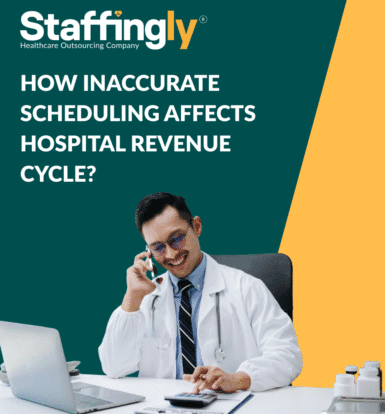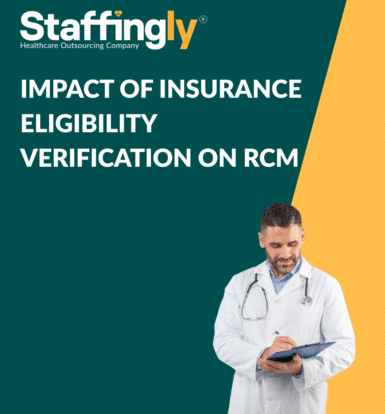On-Demand Outsourcing BPO Services for Healthcare Providers With 24/7 Coverage!
Save up to 70% on staffing costs!
Browse Specialty Staffing Services
Challenges In Coordinating Physician And Patient Schedules
Coordinating physician and patient schedules is a complex balancing act that lies at the heart of healthcare efficiency. While technological advancements have improved appointment systems, healthcare facilities still face several persistent challenges that hinder effective scheduling. These barriers can impact access to care, physician productivity, and ultimately, hospital revenue. 1. Mismatch Between Physician Availability and Patient Demand Physicians often have limited availability due to administrative duties, inpatient rounds, surgeries, and academic commitments. On the other hand, patients prefer flexible appointment

How Inaccurate Scheduling Affects Hospital Revenue Cycle?
In the intricate ecosystem of healthcare operations, scheduling serves as the gatekeeper to the patient journey. From initial appointments to follow-up procedures, scheduling directly influences clinical workflows, resource allocation, and, most critically, the hospital’s revenue cycle. Yet, inaccuracies in scheduling remain a persistent challenge, with profound consequences on financial health, patient satisfaction, and operational efficiency. 1. Delayed or Denied Reimbursement One of the most immediate and costly outcomes of inaccurate scheduling is the impact on reimbursement: Authorization Issues: Many procedures

Enhancing Patient Experience Through Healthcare Revenue Cycle Management
In today’s patient-centered healthcare landscape, financial experience plays an increasingly critical role in overall satisfaction. The healthcare revenue cycle, once seen purely as a back-office function, now significantly influences how patients perceive their care journey. From appointment scheduling to final billing, each financial interaction contributes to the overall experience. Optimizing the revenue cycle with a patient-first approach is essential not only for revenue retention but also for fostering trust, transparency, and loyalty. The Link Between Revenue Cycle and Patient Experience

Optimizing the Healthcare Revenue Cycle Management Process: A Strategic Guide
In the complex world of healthcare administration, revenue cycle management (RCM) plays a critical role in ensuring financial sustainability. It encompasses the entire financial process of patient care, from appointment scheduling to final payment collection. As the healthcare industry continues to shift toward value-based care and digital transformation, optimizing the RCM process has become essential for reducing inefficiencies, increasing revenue, and improving the patient experience. Understanding the Revenue Cycle in Healthcare The healthcare revenue cycle includes all administrative and clinical

RCM Workflow Optimization Strategies in Hospitals
As healthcare systems face rising costs and increasing administrative burdens, optimizing Revenue Cycle Management (RCM) workflows has become a critical priority for hospitals. RCM encompasses the entire process of managing patient revenue—from registration to final payment—and inefficiencies at any stage can result in significant financial losses, delayed payments, and patient dissatisfaction. By strategically refining each component of the workflow, hospitals can boost operational performance, improve cash flow, and enhance overall care delivery. Key Areas of the RCM Workflow Before exploring

AI Tools for Healthcare Revenue Cycle Automation
Healthcare organizations face increasing pressure to optimize financial performance while maintaining high-quality care. At the heart of this challenge is the Revenue Cycle Management (RCM) process—a series of administrative and clinical functions that capture, manage, and collect patient service revenue. Traditionally manual and error-prone, RCM is now being transformed by Artificial Intelligence (AI). From claim submission to denial management, AI-powered tools are automating repetitive tasks, reducing errors, and accelerating cash flow. What Is Revenue Cycle Automation? Revenue cycle automation uses

HIPAA Compliance in Revenue Cycle Management Workflows
In the digital age of healthcare, Revenue Cycle Management (RCM) involves a complex flow of patient data—from scheduling and insurance verification to coding, billing, and collections. At the core of this data exchange lies one critical requirement: HIPAA compliance. The Health Insurance Portability and Accountability Act (HIPAA) sets the national standard for protecting sensitive patient information. Failure to follow HIPAA guidelines within RCM workflows can lead to costly penalties, reputational harm, and compromised patient trust. What Is HIPAA and Why

Impact Of Insurance Eligibility Verification On RCM
In today’s complex healthcare landscape, efficient Revenue Cycle Management (RCM) is crucial for the financial stability of any medical practice or hospital. Among the many components that influence RCM performance, insurance eligibility verification stands out as one of the most critical early steps. Ensuring that a patient’s insurance information is accurate and up to date before services are rendered can significantly reduce claim denials, improve cash flow, and enhance patient satisfaction. What Is Insurance Eligibility Verification? Insurance eligibility verification is
 Book a Demo to Build Your Team Today!
Book a Demo to Build Your Team Today!


 Read Case Studies
Read Case Studies 



 Virtual Medical Assistants
Virtual Medical Assistants



